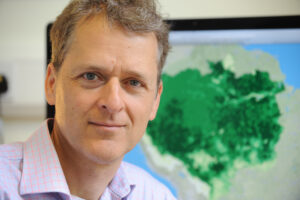Chair of Global Change Ecology
My research and teaching
I study the interaction of terrestrial ecosystems with the climate system, disturbance and management. My goal is to understand the dynamics of the carbon cycle, plant growth, and to support sustainable management of the global landscape.

My Research
My research is on understanding the terrestrial carbon cycle and its links to global change. The carbon cycle links the biological processes of living things to the physical environment and climate. Carbon, through its links to natural resources such as food and wood, is fundamental to our society and its sustainability. I study carbon cycling of plants and soils, and their interactions, across environmental and biodiversity gradients from the tropics to the arctic, to understand carbon sinks and sources across the globe. I explore feedback processes between soil, vegetation and the atmosphere, over timescales from days to years, to improve modelling of climate change. I use process based modelling and data assimilation methods to extract information from detailed ecosystem measurements. Linking to earth observations, I use models to upscale field measurements and ecological experiments, to investigate landscape processes and predict their sensitivity to disturbance and climate. I focus particularly on issues relating to the drought sensitivity of forests, the role of disturbance (fire or anthropogenic) on forest biomass, the sensitivity of Arctic ecosystems to warming, and the yield of crops. Understanding and simulating the non-steady state behaviour of ecosystems is a current focal interest.
My Impact
I am seconded into the Scottish Government as their Chief Scientific Advisor for Environment, Natural Resources and Agriculture.
- My role is to provide advice to ministers, to ensure relevant science is used appropriately in government, and to oversee government research funding in relevant areas. I took on this role to allow science to help shape critical policy areas relating to net zero, biodiversity, climate adaptation and land use. My role spans 5 years from Jan 2022 – Dec 2026.
I provide advice to the European Space Agency on their Biomass mission to measure forests from space.
- The mission launched in April 2025 and its first striking images were reported in June 2025. Biomass will provide unprecedented detail on the structure and carbon stocks of the world’s equatorial forests. My group will use the data to understand the ecological and carbon cycling of this critical ecosystems.
I am a principal investigator for the Scottish Observatory for Atmospheric Research.
- This 100 m purpose built tower, based near Dundee with our partners at JHI, provides detailed measurements of Scotland’s atmosphere and its greenhouse gas (GHG) concentrations. These data are vital for monitoring and understanding national and global efforts to reduce GHG emissions and avoid dangerous climate change.
I led an impact case study for the Research Excellence Framework 2021 on Fusing satellite observations with models to guide and influence tropical forest management and policy
Learn more
You can view my publications here.
You can view my funding sources and project here.
Latest blog: February 2019
Understanding the Amazon rainforest through a UK-Brazil science partnership




 orcid.org/0000-0001-6117-5208
orcid.org/0000-0001-6117-5208